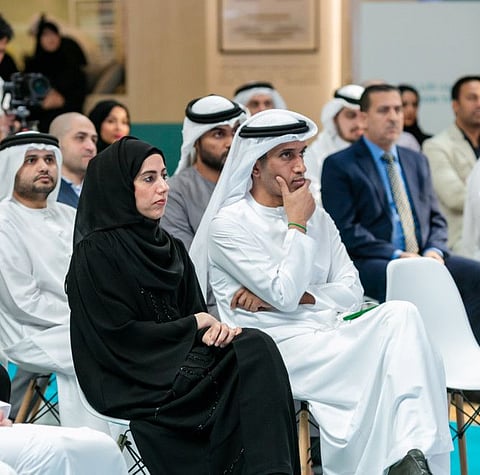‘Innovation Talks’ charts Dubai’s path to a sustainable future
Day three showcased UAE and Dubai’s successes in adopting innovation

Dubai: The ‘Innovation Talks’ series, organised by The Executive Council of Dubai, concluded on Wednesday with leaders from the government, business and the community highlighting how innovation can accelerate the nation’s journey towards a sustainable future.
Abdulla Mohammed Al Basti, Secretary General of The Executive Council of Dubai, thanked the Mohammed bin Rashid Centre for Government Innovation for its pioneering role and constant efforts to promote a culture of innovation across the UAE.
Al Basti said: “Innovation is about creative minds collaborating together in an empowering environment. Dubai has become the best and most inspiring example globally for institutionalising the innovation process, which was first laid down by the late Sheikh Rashid bin Saeed Al Maktoum through several megaprojects launched. Innovation was further advanced in Dubai by His Highness Sheikh Mohammed bin Rashid Al Maktoum, Vice President and Prime Minister of the UAE and Ruler of Dubai. Sheikh Hamdan bin Mohammed bin Rashid Al Maktoum, Crown Prince of Dubai and Chairman of The Executive Council of Dubai, also continues to consolidate excellence and leadership in the city.
Effective partnership model
“Over the last three days, we have seen an effective partnership model between the public and private sector in Dubai and how it can help transform innovation into a culture that enhances the UAE’s competitiveness. We all learnt how innovation can help formulate strategies and unlock new achievements for some of the most successful government entities and companies.”
Younus Al Nasser, Assistant Director General of Digital Dubai, and CEO of the Dubai Data Establishment, opened day three with a speech exploring ‘The Role of Data in Innovation and Future-Shaping’.
Al Nasser said the Dubai Data Establishment supports policymaking with real-time, trustworthy data to shape the emirate’s future. The integrated system is inspired by the vision of Sheikh Mohammed bin Rashid Al Maktoum.
Four main pillars
He said: “We work under four main pillars. The first is trust and partnership, shown through our cooperation with the private sector to share knowledge and achieve results. Data solutions is the second pillar we work under. We deal with it in innovative ways so it can be used without infringing data privacy. The third pillar is regulating big data walls. In 2017, we launched a unified data portal with more than 900 databases that all companies and entities can benefit from. Finally, the most important pillar, is creating value by leveraging data for policymaking in healthcare, education, government administration, real estate, transportation and others.”
Al Nasser highlighted examples from successful case studies on data adoption and handling in Dubai. Confronting the COVID-19 pandemic using technology, databases and artificial intelligence represented a national and global success story, he said. This is thanks to the Government of Dubai’s support for the launch of a command-and-control centre. It integrated government efforts, providing real-time data to decision-makers on the evolving healthcare situation, medical stocks and expected scenarios that reached 90% accuracy, he added.
Tackling climate change
Mohammed Al Shamsi, Chief Officer for Climate Change & Sustainability at the Dubai Electricity and Water Authority (DEWA), said that the UAE was one of the world’s first countries to make environmental protection and tackling climate change among its top priorities. DEWA is at the forefront of providing critical infrastructure through its electricity production capacity of 13,000 megawatts, and its water production of more than 490 million gallons per day.
Al Shamsi listed several sustainability achievements, including the deployment of 350 charging stations for electric cars, reducing water network losses to less than 4.5% and electricity network losses to 2.2%, which far exceed global averages. It also raised the percentage of renewable energy in its energy mix to 11.4% and recorded a milestone by becoming the first organisation in the world to use nanosatellites to improve its operations. It launched the first hydrogen pilot project in the Middle East and the world, and the impact of these efforts helped to reduce 73 million tonnes of carbon emissions between 2006 and 2021.
Innovation Talks
Organised by The Executive Council of Dubai, the latest ‘Innovation Talks’ series brought together heads and representatives of Dubai government departments, and experts from major private sector companies to discuss how they can work together to develop a common vision for the future. The talks series forms part of Dubai’s participation in the eighth edition of ‘UAE Innovates 2023’. It emphasises the importance of innovation, especially in providing services, increasing the effectiveness of procedures and keeping pace with recent technical and technological developments.



![Judgment holds local arm of international tech company legally responsible. [Illustrative image]](http://media.assettype.com/gulfnews%2F2026-03-02%2Fnh2vujch%2F202509173512728.jpg?w=320&auto=format%2Ccompress&fit=max)